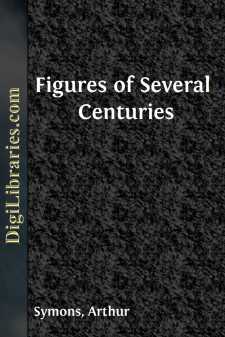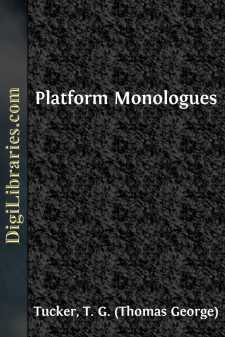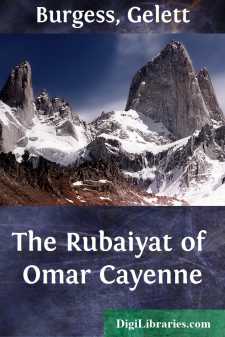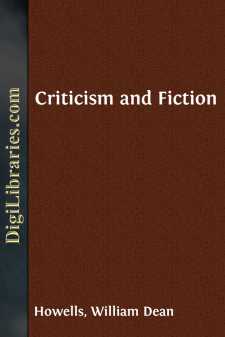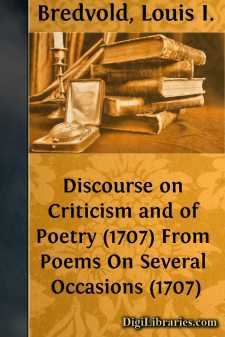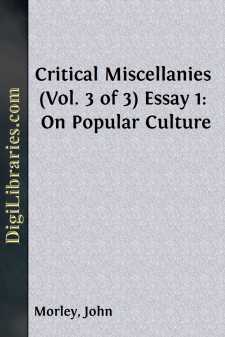Literary Criticism
- American 18
- Ancient and Classical 3
- Asian 1
- Australian & Oceanian 1
- Books & Reading 8
- Caribbean & Latin American 2
- Drama 2
- English, Irish, Scottish, Welsh 49
- European 7
- General
- Horror 1
- Humor 2
- Jewish 2
- Medieval 2
- Middle Eastern 3
- Poetry 7
- Renaissance 6
- Russian & Former Soviet Union 1
- Shakespeare 27
General Books
Sort by:
by:
Arthur Symons
SAINT AUGUSTINE The Confessions of St. Augustine are the first autobiography, and they have this to distinguish them from all other autobiographies, that they are addressed directly to God. Rousseau's unburdening of himself is the last, most effectual manifestation of that nervous, defiant consciousness of other people which haunted him all his life. He felt that all the men and women whom he...
more...
The Problem of a Preface A peculiar difficulty arrests the writer of this rough study at the very start. Many people know Mr. Bernard Shaw chiefly as a man who would write a very long preface even to a very short play. And there is truth in the idea; he is indeed a very prefatory sort of person. He always gives the explanation before the incident; but so, for the matter of that, does the Gospel of St....
more...
CHAUCER March 17, 1894. Professor Skeat's Chaucer. After twenty-five years of close toil, Professor Skeat has completed his great edition of Chaucer. It is obviously easier to be dithyrambic than critical in chronicling this event; to which indeed dithyrambs are more appropriate than criticism. For when a man writes Opus vitæ meæ at the conclusion of such a task as this, and so lays down his...
more...
The Supreme Literary Gift When we have been reading some transcendent passage in one of the world's masterpieces we experience that mental sensation which Longinus declares to be the test of true sublimity, to wit, our mind "undergoes a kind of proud elation and delight, as if it had itself begotten the thing we read." We are disposed by such literature very much as we are disposed by the...
more...
PREFACE. The following treatise was awarded the Harness Prize at Cambridge in 1904. I have, however, revised it since then, and in some matters considerably enlarged it. A list of the chief authorities to whom I am indebted will be found at the end of the book, but it is fitting that I should here make particular mention of my obligations to the exhaustive work of Mr Bond. Not only have his labours of...
more...
by:
Gelett Burgess
OMAR CAYENNE IWake! For the Hack can scatter into flightShakespere and Dante in a single Night!The Penny-a-liner is Abroad, and strikesOur Modern Literature with blithering Blight.Before Historical Romances died,Methought a Voice from Art's Olympus cried,"When all Dumas and Scott is still for Sale,Why nod o'er drowsy Tales, by Tyros tried?" IIIA cock-sure Crew with Names ne'er...
more...
BIBLIOGRAPHICAL The papers collected here under the name of 'My Literary Passions' were printed serially in a periodical of such vast circulation that they might well have been supposed to have found there all the acceptance that could be reasonably hoped for them. Nevertheless, they were reissued in a volume the year after they first appeared, in 1895, and they had a pleasing share of such...
more...
The question of a final criterion for the appreciation of art is one that perpetually recurs to those interested in any sort of aesthetic endeavor. Mr. John Addington Symonds, in a chapter of 'The Renaissance in Italy' treating of the Bolognese school of painting, which once had so great cry, and was vaunted the supreme exemplar of the grand style, but which he now believes fallen into...
more...
Introduction What little is known of the life of Samuel Cobb (1675-1713) may be found in the brief article in the Dictionary of National Biography by W.P. Courtney. He was born in London, and educated at Christ's Hospital and at Trinity College, Cambridge, where he obtained the degrees of B.A., 1698, and M.A., 1702. He was appointed "under grammar master" at Christ's Hospital in 1702...
more...
by:
John Morley
The proceedings which have now been brought satisfactorily to an end are of a kind which nobody who has sensibility as well as sense can take a part in without some emotion. An illustrious French philosopher who happened to be an examiner of candidates for admission to the Polytechnic School, once confessed that, when a youth came before him eager to do his best, competently taught, and of an apt...
more...


